|
|
|
Sort Order |
|
|
|
Items / Page
|
|
|
|
|
|
|
| Srl | Item |
| 1 |
ID:
102198
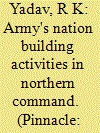

|
|
|
| 2 |
ID:
110324
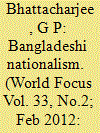

|
|
|
| 3 |
ID:
126140
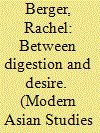

|
|
|
|
|
| Publication |
2013.
|
| Summary/Abstract |
This paper takes up the project of conceptualizing a new history of food in India through an exploration of conversations about food, digestion, desire, and embodiment that took place in Hindi-language publications in early-twentieth century North India. Through an exploration of cookbooks, guides to health and wellness, and food advertising spanning the 1920s to the 1940s, conversations about food preparation, consumption, and distribution come to be revealed as significant anchors of historical, political, economic, and cultural debates about the Indian nation in this period. The centrality of food to conversations that took up the reproduction and regeneration of the Hindu middle class helped to conceptualize an idealized Indian nation[A]. Subsequently, the focus on food advertising imagined the transformation of these citizens into consumers. Moving beyond the colonial fascination with native bodies and tropical constitutions, this paper demonstrates the ways in which the conversations that emerged out of a focus on food in popular culture did the work of envisioning new possibilities for post-colonial embodiment.
|
|
|
|
|
|
|
|
|
|
|
|
|
|
|
|
| 4 |
ID:
132961
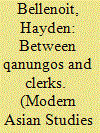

|
|
|
|
|
| Publication |
2014.
|
| Summary/Abstract |
This paper argues that our understanding of the transition to colonialism in South Asia can be enriched by examining the formation of revenue collection systems in north India between 1750 and 1850. It examines agrarian revenue systems not through the prism of legalism or landholding patterns, but by looking at the paper and record-based mechanisms by which wealth was actually extracted from India's hinterlands. It also examines the Kayastha pensmen who became an exponentially significant component of an Indo-Muslim revenue administration. They assisted the extension of Mughal revenue collection capabilities as qanungos (registrars) and patwaris (accountants). The intensity of revenue assessment, extraction and collection had increased by the mid 1700s, through the extension of cultivation and assessment by regional Indian kingdoms. The East India Company, in its agrarian revenue settlements in north India, utilized this extant revenue culture to push through savage revenue demands. These Kayastha pensmen thus furnished the 'young' Company with the crucial skills, physical records, and legitimacy to garner the agrarian wealth which would fund Britain's Indian empire. These more regular patterns of paper-oriented administration engendered a process of 'bureaucratization' and the emergence of the modern colonial state.
|
|
|
|
|
|
|
|
|
|
|
|
|
|
|
|
| 5 |
ID:
169264
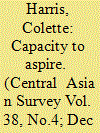

|
|
|
|
|
| Summary/Abstract |
Rather than studying young men's career- and/or economic-based aspirations, this article explores the obstacles that hinder youths of both sexes in gerontocratic southern Tajikistan and North India from developing the capacity to make their own life choices. Focusing mainly on the selection of marital partner and largely on women, I explore the narratives of those who have never even dreamed of a good life, of others who have dreamed but been unable to actualize their dreams, of a few who have started to plan the way forward, and of a tiny number who actually managed to achieve their aspirations, teasing out the influences that facilitate this. I suggest that even educated youths with some control over their public lives are constricted by their family relations and that it requires quite specific support to defy one’s family, which can create significant vulnerabilities in settings with no other safety net.
|
|
|
|
|
|
|
|
|
|
|
|
|
|
|
|
| 6 |
ID:
120945
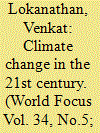

|
|
|
| 7 |
ID:
118049
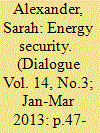

|
|
|
| 8 |
ID:
145541
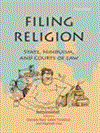

|
|
|
|
|
| Publication |
New Delhi, Oxford University Press, 2016.
|
| Description |
xlvi, 358p.hbk
|
| Standard Number |
9780199463794
|
|
|
|
|
|
|
|
|
|
|
|
Copies: C:1/I:0,R:0,Q:0
Circulation
| Accession# | Call# | Current Location | Status | Policy | Location |
| 058689 | 210.1/BER 058689 | Main | On Shelf | General | |
|
|
|
|
| 9 |
ID:
099926
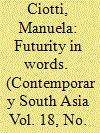

|
|
|
|
|
| Publication |
2010.
|
| Summary/Abstract |
Drawing on ethnographic fieldwork in Uttar Pradesh, this article explores low-caste women political activists' self-representation. Low-caste communities have been mobilised to supra-local ideologies that posit 'classic' forms of subalternity such as the Dalit condition - and the rights and entitlements attached to it - as their rallying symbols. This article offers a counter-intuitive example to expressions of the burgeoning Dalit identity in north Indian society. In particular, it shows resistance to the usage of the Dalit label for self-representation by a number of low-caste women activists within the Bahujan Samaj Party. From women's narratives it emerges that 'Dalit' - implying a caste-laden ontological condition of subalternity - is denied on the grounds of its disempowering connotations. These narratives are all the more salient in consideration of the layered structure of gendered, socio-economic, cultural and political marginalities that low-caste women usually experience. While these findings unearth the discrepancies between subaltern pasts and cultures vis-a-vis their appropriation by low-caste women in contemporary north Indian society, they also point to vernacular understandings of 'Dalit' in circulation in the Uttar Pradesh public sphere. Moreover, these findings point to the need to de-link caste identity from agency, and to ethnography as a tool to (re)construct their nexus. Finally, by foregrounding the historicity of the Dalit label, this article encourages reflection on its widespread use.
|
|
|
|
|
|
|
|
|
|
|
|
|
|
|
|
| 10 |
ID:
174137
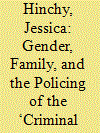

|
|
|
|
|
| Summary/Abstract |
In the South Asian setting, the fields of gender history and family history are still predominantly concerned with relatively elite social groups. Few studies have examined issues of gender and the family in the history of Dalit, low-caste, and socially marginalized communities, especially those that were labelled ‘criminal tribes’ from the mid-nineteenth century on. This article explores the ways in which gender patterned criminalized communities’ experiences of everyday colonial governance under Part I of the 1871 Criminal Tribes Act (CTA) in the first two decades that it was enforced in northern India. In this early period, the colonial government did not closely regulate marriage practices, domestic arrangements, or the gendered organization of labour within communities categorized as ‘criminal tribes’. Nevertheless, notions of sexuality and gender underlay colonial knowledge of the ‘criminal tribes’, which emerged in dialogue with middle-class Indian gender and caste politics. Moreover, the family unit was the central target of the CTA surveillance and policing regime, which aimed to produce ‘industrious’ families. Officially endorsed forms of labour had complex implications for criminalized communities in the context of North Indian gender norms and strategies of social mobility. Gender power dynamics also shaped criminalized peoples’ interpersonal, embodied interactions with British and Indian colonial officials on an everyday basis. Meanwhile, different forms of leverage and evasion were open to men and women to cope with their criminalization and so the colonial state was experienced in highly gendered ways.
|
|
|
|
|
|
|
|
|
|
|
|
|
|
|
|
| 11 |
ID:
128114
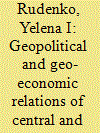

|
|
|
|
|
| Publication |
2013.
|
| Summary/Abstract |
According to many experts on ancient and Medieval history of contacts between Central and South Asian regions in previous centuries, including Janet Rizvi, "the trade from Mysore to Central Asia presented no difficulties". Obviously, not all trades who come to India from Central Asia alongwith their caravans reached coastal part of subcontinent, but rather chose as their final destination, the major cities of North India.
|
|
|
|
|
|
|
|
|
|
|
|
|
|
|
|
| 12 |
ID:
146834
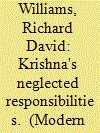

|
|
|
|
|
| Summary/Abstract |
This article examines the literary strategies employed by a devotional poet who wrote about recent events in the eighteenth century, in order to shed light on contemporary notions of social responsibility. Taking the poetic treatment of Ahmad Shah Abdali's invasion of North India and the sacking of Vrindavan in 1757 as its primary focus, the article will discuss how political and theological understandings of lordship converged at a popular level, such that a deity could be called to account as a neglectful landlord as well as venerated in a bhakti context. It examines the redaction of tropes inherited from both vaisnava literature and late Mughal ethical thought, and considers the parallels between the Harikala Beli, a Braj Bhasha poem, and immediately contemporary developments in Urdu literature, particularly the shahr ashob genre. As such, it uses poetic responses to traumatic events as a guide to the interaction between multiple intellectual systems concerned with human and divine expectations and obligations.
|
|
|
|
|
|
|
|
|
|
|
|
|
|
|
|
| 13 |
ID:
001580


|
|
|
|
|
| Publication |
DelhI, Oxford University Press, 1998.
|
| Description |
xii, 270p.pbk
|
| Standard Number |
0195640764
|
|
|
|
|
|
|
|
|
|
|
|
Copies: C:1/I:0,R:0,Q:0
Circulation
| Accession# | Call# | Current Location | Status | Policy | Location |
| 041100 | 954.02/CHA 041100 | Main | On Shelf | General | |
|
|
|
|
| 14 |
ID:
141554
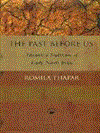

|
|
|
|
|
| Publication |
Ranikhet, Permanent Black, 2013.
|
| Description |
xvii, 758p.hbk
|
| Standard Number |
8178242958
|
|
|
|
|
|
|
|
|
|
|
|
Copies: C:1/I:0,R:0,Q:0
Circulation
| Accession# | Call# | Current Location | Status | Policy | Location |
| 058361 | 934/THA 058361 | Main | On Shelf | General | |
|
|
|
|
| 15 |
ID:
106503
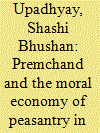

|
|
|
| 16 |
ID:
131804
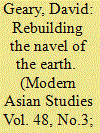

|
|
|
|
|
| Publication |
2014.
|
| Summary/Abstract |
Central to the modern rebirth of Bodh Gaya as the place of Buddha's enlightenment is the growing influence of Buddhist missionaries and transnational religious networks on this pilgrimage landscape in North India. Although this process began in the late nineteenth century, it was not until after India's independence that Buddhism became an integral part of the nation-building project and a key site of post-colonial diplomacy with neighbouring Asian countries. Symbolic of these international and diplomatic ties are the increasing numbers of foreign Buddhist monasteries and temples that have acquired land around Bodh Gaya. This paper seeks to document the historical and transnational religious processes that support the growing globalization of Bodh Gaya and to survey the institutional means through which monasteries have elevated the Buddhist memory of the site. In tracing these different national and regional networks of Buddhism, I argue that there is an underlying tension between Buddhist culture anchored in the national polity and the forces of globalization and religious experience that seek to transcend it.
|
|
|
|
|
|
|
|
|
|
|
|
|
|
|
|
| 17 |
ID:
084244
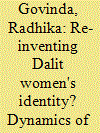

|
|
|
|
|
| Publication |
2008.
|
| Summary/Abstract |
Dalit or ex-untouchable women's voices and perspectives have been marginalized not only in Dalit movements but also in predominantly upper-caste Hindu-led women's movements. This paper aims at exploring the unheard voices and perspectives of Dalit women in the context of Dalit assertion in the state of Uttar Pradesh, north India. Scholarly writing examines the different facets of Dalit political assertion led by the Bahujan Samaj Party in Uttar Pradesh. Few scholars, however, examine the ways in which individual and organizational actors engage with women of Dalit castes through social activism in the state. This paper is an attempt to do so. Specifically, it examines, with special reference to issues of culture and identity, the engagement of a grassroots women's non-governmental organization with rural Dalit women in southern Uttar Pradesh. The paper begins with an enquiry into why engagement with issues of culture and identity is necessary for social activism with Dalit women, and how it is carried out. It then examines whether social activism and electoral politics with Dalit women cross-cut each other, and also what implications this or its lack has for the women. Finally, the paper asks how far activism and politics can go towards re-inventing Dalit (women's) identity.
|
|
|
|
|
|
|
|
|
|
|
|
|
|
|
|
| 18 |
ID:
130817
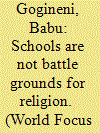

|
|
|
|
|
| Publication |
2014.
|
| Summary/Abstract |
l received recently a communication on Face Book that was rather disconcerting - it was typed in large font in Telugu, one of the Dravidian languages of South India. lt was shrieking that an unnamed school's authorities were considering suspension of a teacher as that teacher made students shout 'Jai Shri Raam' or 'Hail Lord Raama'.
Ø Can I not praise my Lord. Raama in my own country, it wails. I
Ø Was it Lord Raama or Jesus Christ that was born in India, it demands angrily.
Ø Does India belong to the Hindus or to the westerners, it asks mindlessly.
Ø Why should Hindu children sing Christian prayers, it asks with justi?cation.
I Pointing out that almost all Missionary schools in India ban girl pupils from wearing the bindi on the forehead and bangles on their hands, it asks for banning of such Christian Missionary Schools for violation of children's rights.
What is all this about? Lord Raama in Hindu mythology Lord Raama is one _of the l0 avatars or incarnations of Lord Vishnu. immensely important for the Hindus of North India, Raama is revered for his obedient ?lial morality, for his valiance as a warrior and for his rule as an ideal king.
|
|
|
|
|
|
|
|
|
|
|
|
|
|
|
|
| 19 |
ID:
098876
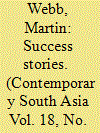

|
|
|
|
|
| Publication |
2010.
|
| Summary/Abstract |
This article will look at the use of 'success stories' by groups involved in the Right to Information movement in north India. Success stories are narratives tailored by activists to promote active citizenship and to persuade publics that Right to Information legislation can improve accountability in everyday bureaucratic processes by balancing the power relationship between the citizen and the public servant. Success stories might be reproduced as first-hand, text or audio-visual accounts, and the Internet has enabled wide reproduction and dissemination of some narratives in particular. As rhetorical devices, success stories play an important role in activist groups' attempts to frame citizenship and bureaucratic accountability but also have a role in promoting movement cohesion and continuity. Success stories presented at conferences by authentic grassroots activists help to show influential movement sympathisers and policy-makers that the movement is socially diverse and that ordinary people are participating. The conscious use of rhetoric is part of building a sense of belonging to particular groups or to the wider movement. An ethnographic focus on the production, reproduction and performance of success stories reveals the extent to which concern over representation is central to activist practice and identity.
|
|
|
|
|
|
|
|
|
|
|
|
|
|
|
|
| 20 |
ID:
090337
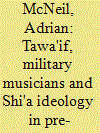

|
|
|
|
|
| Publication |
2009.
|
| Summary/Abstract |
Lucknow occupies a particularly poignant place in the musical imagination of North India. A city with a proud cultural history, Lucknow in the first half of the nineteenth century nurtured an explosion of innovations in vocal music, instrumental music and dance whose effects were felt well beyond the Awadh region. Memories of this sublime period of creativity are still today capable of evoking a potent sense of nostalgia amongst connoisseurs. That such memories so passionately endure is testimony to the special place that the arts occupied in the life of that city when it was the capital of a kingdom.
|
|
|
|
|
|
|
|
|
|
|
|
|
|
|
|
|
|
|
|
|